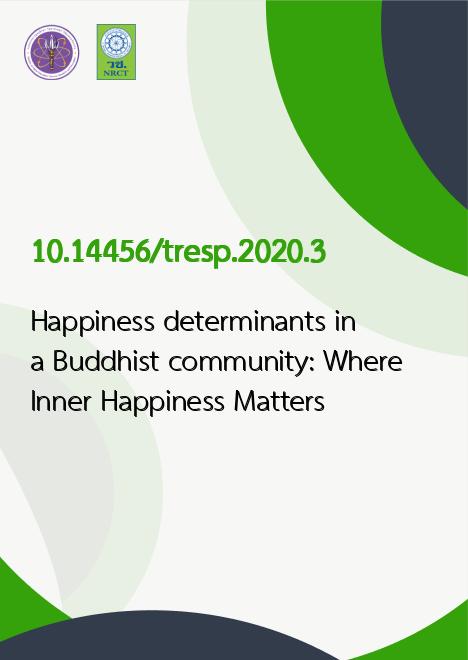
|
Happiness determinants in a Buddhist community: Where Inner Happiness Matters |
|---|---|
| รหัสดีโอไอ | |
| Creator | Sauwalak Kittiprapas |
| Title | Happiness determinants in a Buddhist community: Where Inner Happiness Matters |
| Publisher | Thammasat University |
| Publication Year | 2563 |
| Journal Title | Thammasat Review of Economic and Social Policy |
| Journal Vol. | 6 |
| Journal No. | 1 |
| Page no. | 84-134 |
| Keyword | Happiness, Sustainable Happiness, Sustainable Development |
| URL Website | http://www.tresp.econ.tu.ac.th/ |
| Website title | Thammasat Review of Economic and Social Policy |
| ISSN | 2465-4167 |
| Abstract | This case study explores happiness determinants in a green-space community with Buddhist culture in Bangkok's periphery. A primary survey for almost 500 samples of residents during late 2018 to early 2019 was conducted. The study found that happiness of community members is generated by inner happiness indicators and environment quality, among other significant factors such as the perception of equal income status, good family and community relationship, health and time balance. In addition, good family-economic management is highly significant for happiness of this community where absolute income is not significant to happiness. These findings are in line with Buddhist concepts and sufficiency economy philosophy; namely, the feeling of contentment or "enough" with what one has and managing family economic situation to have sufficient net income without debt is positively significant for happiness, while absolute income does not significantly affect their happiness. From general tests, the feeling of "enough" shows the largest effect to happiness of this community, followed by family and community relationship, quality of environment, health, time, and management of suffering. The empirical study investigates further by disaggregating the sample into sub-groups. It is found that "enough" has the largest effect for the lowest income group (in comparison) and the agricultural group, but not significant for the highest income group. In addition, wants beyond basic need has negative relationship with happiness for the middle-income group, reflecting that the higher the unnecessary wants, the less happiness they have. It is also found that inner happiness such as mindfulness and management of suffering are positively conducive to happiness of the group reporting "enough" or having satisfaction in their material levels. |